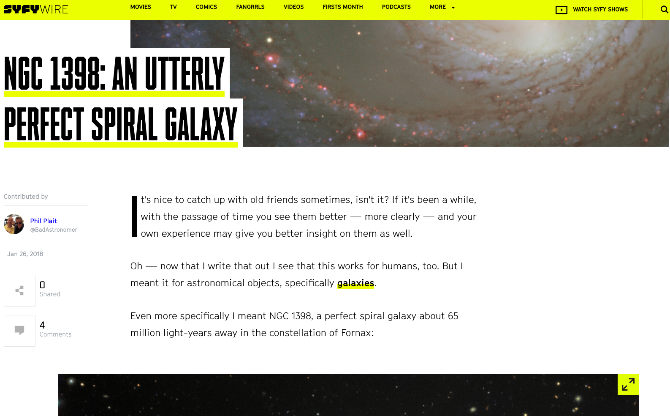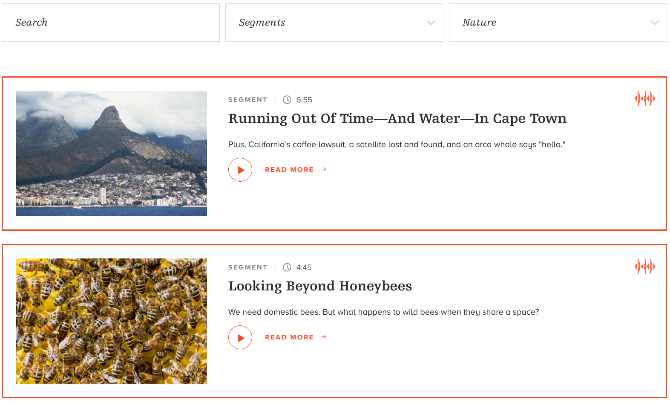News about the latest in scientific research tends to be complex and full of jargon. That's troubling, and a reason so many people don't trust science news. If you find it overwhelming, here are some sites and blogs that put the news in layman's terms.
Even big sites like the BBC or Science Daily make it tough for seasoned readers to follow science news. Instead, blogs like ZME Science and the Science Friday podcast add context to any news, and define words and phrases that you wouldn't understand otherwise.
Depending on how you like to follow the news, there is something for everyone here: constant updates, weekly summaries, or long features that offer a rounded perspective of research news on any topic.
1. ZME Science (Web): The Simple Science Blog for Anyone
For science junkies, ZME Science is the first place you should go to. It tracks news in myriad fields and puts it in simple language for anyone to understand.
Take this article about a cancer vaccine terminating tumors in mice, for example. This news was reported in several news outlets, but ZME Science's article explains it best.
The writer takes the trouble of adding context about the other recent research that the study refers to. The article also lays out why the stakes are so high. And it is also quick to point out that 90 percent of drugs tested in rats fail in human trials. Context makes all the difference, doesn't it?
You can follow ZME Science on any of the major social networks, or use an RSS feed for updates. And if you get confused, the authors actively answer any scientific questions you might have.
2. Bad Astronomy (Web): Space and Universe in Fun and Easy Language
Neil deGrasse Tyson gets most of the attention in astronomy today, but you're missing out if you don't read astronomer Phil Plait's famous long-standing blog, Bad Astronomy. The column was earlier in Discover magazine and then on Slate, and finally has a new home today on SyFy.
Bad Astronomy is an incredible look at the world beyond the earth. Plait's casual and friendly writing style is what sets this apart. He isn't afraid of using jargon for those who understand it, but what's reassuring is that he identifies and explains such jargon every time. For an example of this, check out his almost poetic treatise on the perfect spiral galaxy.
Incidentally, Plait also made it to our list of popular scientists on Twitter, so you can follow him there too. His writing is among the best ways to learn about the universe.
3. Science Friday (Podcast) and SciFri Spoonfuls (Web): For Grown-Ups and Kids
NPR's Science Friday is among the older science-oriented radio programs and podcasts on the internet. That's probably why host Ira Flatow and the team have gotten so good at recapping what happened in science news in the week, in the simplest words possible.
But while the podcast is great, the website is the gem here. Science Friday's podcast is broken up into segments of five minutes or so, all of which have been neatly categorized on the site. Topics include earth science, space, physics and chemistry, nature, energy, math, and much more. Click one to find a list of segments that you can play for free. It's an amazing repository.
And then there is SciFri Spoonfuls, which introduce scientific concepts to children. Each Spoonful contains a short piece of media (article, video, radio interview), a transcript (for video and radio), student questions, and activity suggestions. Honestly, it's not just for children, us grown-ups could use a refresher course in many of these concepts.
4.This Week In Science (Web): Weekly Science News Digest
Futurism is among the best science sites on the internet. Its infographics and videos, especially, are spectacular and a great way to see predicted timelines of humans or earth. But what you probably didn't know about is the weekly column.
For a science news digest, it doesn't get better than this. Every week, Futurism highlights six news items in a digest that can be read online or sent directly to your inbox. And you'll probably get some really cool videos with it too.
Everything about Futurism is fun for a science junkie. The news is written in simple language, the features are extensive and well-researched, and the videos boast of good production values. You can't go wrong with this one.
5. Life In Layman's (Web): In-Depth Articles in Layman's Terms
The newest site in this list, there aren't too many pieces written on Life In Layman's. But author Paul Figg is doing his best as a one-man team, and each one of the articles so far is worth a read.
He dives into weird but fascinating questions like finding out if humans have a mating season, like all other animals in the wild. Or what it's going to be like in 2050, when 10 million people are estimated to die annually because of antibiotic-resistant infections. Figg digs into research about the subject and explains it in simple, jargon-free terms.
This is the kind of site to head to if you love weird science claims, and we can only hope Figg produces more articles regularly.
Is There a War on Science?
These sites put in a lot of effort to simplify science news so that we can all understand it. But does that mean we should trust the news itself? After all, a recent study found that most scientists can't replicate studies by peers. It raises some troubling questions.







